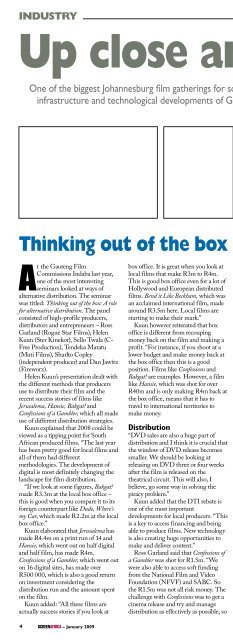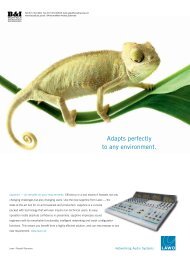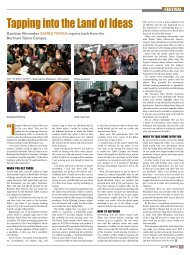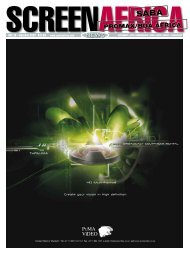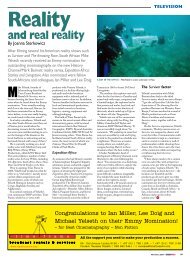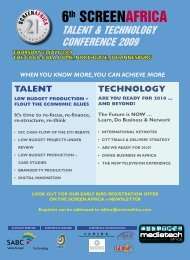Download Part 1 - size: 2.0mb - Screen Africa
Download Part 1 - size: 2.0mb - Screen Africa
Download Part 1 - size: 2.0mb - Screen Africa
You also want an ePaper? Increase the reach of your titles
YUMPU automatically turns print PDFs into web optimized ePapers that Google loves.
INDUSTRY<br />
Up close and personal<br />
One of the biggest Johannesburg film gatherings for some years took place in November last year at the 2008 Film<br />
infrastructure and technological developments of Gauteng, but also presented an opportunity for the industry to<br />
Thinking out of the box<br />
At the Gauteng Film<br />
Commissions Indaba last year,<br />
one of the most interesting<br />
seminars looked at ways of<br />
alternative distribution. The seminar<br />
was titled: Thinking out of the box: A role<br />
for alternative distribution. The panel<br />
consisted of high-profile producers,<br />
distributors and entrepreneurs – Ross<br />
Garland (Rogue Star Films), Helen<br />
Kuun (Ster Kinekor), Sello Twala (C-<br />
Free Production), Tendeka Matatu<br />
(Muti Films), Sharlto Copley<br />
(independent producer) and Dan Jawitz<br />
(Fireworx).<br />
Helen Kuun’s presentation dealt with<br />
the different methods that producers<br />
use to distribute their film and the<br />
recent success stories of films like<br />
Jerusalema, Hansie, Bakgat! and<br />
Confessions of a Gambler, which all made<br />
use of different distribution strategies.<br />
Kuun explained that 2008 could be<br />
viewed as a tipping point for South<br />
<strong>Africa</strong>n produced films. “The last year<br />
has been pretty good for local films and<br />
all of them had different<br />
methodologies. The development of<br />
digital is most definitely changing the<br />
landscape for film distribution.<br />
“If we look at some figures, Bakgat!<br />
made R3.3m at the local box office –<br />
this is good when you compare it to its<br />
foreign counterpart like Dude, Where’s<br />
my Car, which made R2.2m at the local<br />
box office.”<br />
Kuun elaborated that Jerusalema has<br />
made R4.4m on a print run of 14 and<br />
Hansie, which went out on half digital<br />
and half film, has made R4m.<br />
Confessions of a Gambler, which went out<br />
on 16 digital sites, has made over<br />
R500 000, which is also a good return<br />
on investment considering the<br />
distribution run and the amount spent<br />
on the film.<br />
Kuun added: “All these films are<br />
actually success stories if you look at<br />
box office. It is great when you look at<br />
local films that make R3m to R4m.<br />
This is good box office even for a lot of<br />
Hollywood and European distributed<br />
films. Bend it Like Beckham, which was<br />
an acclaimed international film, made<br />
around R3.5m here. Local films are<br />
starting to make their mark.”<br />
Kuun however reiterated that box<br />
office is different from recouping<br />
money back on the film and making a<br />
profit. “For instance, if you shoot at a<br />
lower budget and make money back at<br />
the box office then this is a good<br />
position. Films like Confessions and<br />
Bakgat! are examples. However, a film<br />
like Hansie, which was shot for over<br />
R40m and is only making R4m back at<br />
the box office, means that it has to<br />
travel to international territories to<br />
make money.<br />
Distribution<br />
“DVD sales are also a huge part of<br />
distribution and I think it is crucial that<br />
the window of DVD release becomes<br />
smaller. We should be looking at<br />
releasing on DVD three or four weeks<br />
after the film is released on the<br />
theatrical circuit. This will also, I<br />
believe, go some way in solving the<br />
piracy problem.”<br />
Kuun added that the DTI rebate is<br />
one of the most important<br />
developments for local producers. “This<br />
is a key to access financing and being<br />
able to produce films. New technology<br />
is also creating huge opportunities to<br />
make and deliver content.”<br />
Ross Garland said that Confessions of<br />
a Gambler was shot for R1.5m. “We<br />
were also able to access soft funding<br />
from the National Film and Video<br />
Foundation (NFVF) and SABC. So<br />
the R1.5m was not all risk money. The<br />
challenge with Confessions was to get a<br />
cinema release and try and manage<br />
distribution as effectively as possible, so<br />
we went out on 15 screens around the<br />
country. When we went into the Cape<br />
Flats we knocked US films off and<br />
became the most popular film. It is<br />
crucial to know your audience. My<br />
view, however, is that for a film release,<br />
you need wide release.”<br />
Garland said that Faith Like Potatoes<br />
in a way was the film that changed<br />
perspectives. “They did their own<br />
distribution and made money. We also<br />
did our own release for Confessions.”<br />
Tendeka Matatu explained their<br />
path. “We shot Jerusalema for R14m on<br />
pure equity. We had pre-sold the film<br />
into some international territories and<br />
had an international sales agent.<br />
However, the benchmark for us was<br />
how well the film would do with local<br />
audiences and this has proved to be a<br />
success story.”<br />
Matatu added: “We also had a very<br />
specific idea of how we wanted to<br />
distribute the film with specific<br />
audiences in mind. We went out on<br />
35mm film projection and had a 14<br />
print run and moved it around to<br />
specific sites. For instance the film is<br />
now only playing in some of the smaller<br />
provinces.”<br />
The two crucial elements, Matatu<br />
said, were control of their own<br />
distribution with the decision to go out<br />
on film and to do a limited release.<br />
“We also invested around R200 000 in<br />
P&A and signed a deal with Metro<br />
FM, which gave us publicity on radio<br />
and on SABC. TV reaches the widest<br />
possible audience, which was a great<br />
way of getting the film out there. The<br />
GFC also helped with marketing and<br />
we had some billboards sponsored.”<br />
Sharlto Copley explained his views.<br />
“The simple truth is this: what the<br />
industry comes down to is do you have<br />
the knack to move people, and will they<br />
be moved by what you do? I started out<br />
with my ex-partner with the Space<br />
Shuttle landing in Cape Town on<br />
Internet distribution. The truth is that<br />
the Internet is a horrible leveller and<br />
there is a sea of stuff out there.<br />
However, the clip has received 14<br />
million downloads.<br />
“You have to make exceptional<br />
content to get it seen on the Internet.<br />
The interesting thing with our clip<br />
being distributed was that we could<br />
show people what we were capable of<br />
doing. The people who we wanted to<br />
impress, namely the South <strong>Africa</strong>n<br />
broadcasters, took no notice but we<br />
started getting noticed overseas in<br />
Hollywood. I think this is an<br />
undeniable truth – South <strong>Africa</strong>n<br />
broadcasters do not support talent and<br />
there is generally a lack of support for<br />
embracing and encouraging talent<br />
here.”<br />
Struggle<br />
Copley explained that after Shuttle they<br />
did Hellweek and this enabled them to<br />
get interest from Videovision for their<br />
feature film, Spoon. “However a lot of<br />
this struggle rubbed off on my<br />
professional relationship with my<br />
business partner and we are no longer<br />
together. With Spoon we have also<br />
developed viral and Internet interest.<br />
As a local independent filmmaker you<br />
have to do it all yourself. The lesson is<br />
this: it is hard work but all possible.”<br />
Sello Twala, an entrepreneur,<br />
elaborated on his experience: “One<br />
needs to take a gamble. With our film,<br />
Moruti Wa Tutsi, we shot it for<br />
R300 000 and distributed via DVD in<br />
the townships. To date we’ve made<br />
close to R10m. Black people do not go<br />
to the movies; they watch DVDs at<br />
home. Our other release – My Shit<br />
Father and my Lotto Ticket – is also<br />
doing very well.”<br />
Twala said that this kind of<br />
distribution also eliminates piracy.<br />
“The only way to eliminate piracy is to<br />
compete with the pirates. I will be<br />
selling my DVDs in spaza shops and<br />
filling stations around the country. My<br />
aim is to have music and film<br />
everywhere and accessible to everyone.<br />
The DVD market is growing and it is<br />
only going to get bigger and bigger.”<br />
<br />
SCREENAFRICA – January 2009


